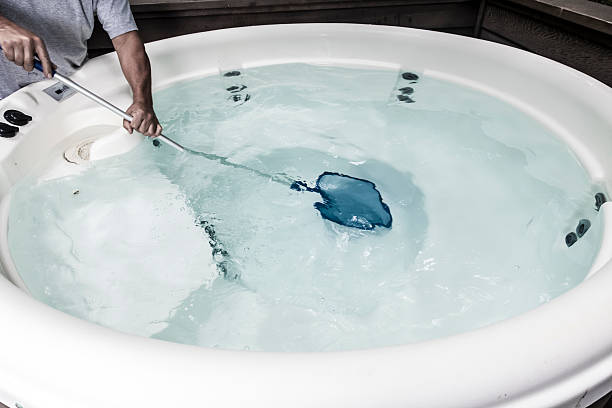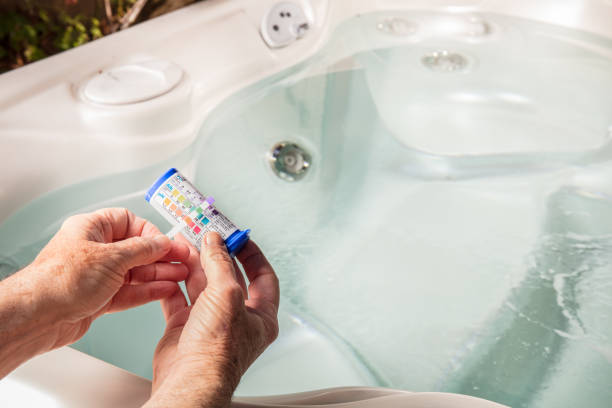A spa and hydrotherapy bath offers a delightful retreat for relaxation. However, to ensure your spa bath remains a haven of tranquillity, it’s essential to prioritise regular maintenance.
In this guide, we’ll explore the importance of spa bath maintenance, highlight the consequences of neglect, and provide you with essential tips on spa cleaners.
The Significance Of Spa Maintenance
Proper spa bath maintenance is essential for several reasons:
- Health and Wellbeing Benefits: Clean and well-maintained spa pools promote good health and wellbeing. Regular use can help relieve stress, improve sleep, and soothe sore muscles.
- Longevity: Consistent maintenance prolongs the lifespan of your spa bath, ensuring years of enjoyment.
- Water Quality: Maintaining water quality is crucial for a safe and comfortable spa bath experience. Clean water reduces the risk of skin irritations and other health concerns.
Proper spa bath maintenance is essential for several reasons:
- Health and Wellbeing Benefits: Clean and well-maintained spa pools promote good health and wellbeing. Regular use can help relieve stress, improve sleep, and soothe sore muscles.
- Longevity: Consistent maintenance prolongs the lifespan of your spa bath, ensuring years of enjoyment.
- Water Quality: Maintaining water quality is crucial for a safe and comfortable spa bath experience. Clean water reduces the risk of skin irritations and other health concerns.
Consequences of Neglecting Spa Maintenance
Neglecting spa maintenance can lead to a range of issues, diminishing your spa bath’s performance and the enjoyment you receive. Some potential consequences include:
- Dirty Spa Baths: Neglected spa baths accumulate dirt, grime, and scum, making them unsightly and unhygienic.
- Infection Risks: Spa baths with poor maintenance can become breeding grounds for harmful bacteria, increasing the risk of infections.
- Reduced Efficiency: Clogged jets, filters, and pumps can reduce water circulation and the effectiveness of hydrotherapy.
- Costly Repairs: Neglect may lead to significant wear and tear, resulting in costly repairs or component replacements.
- Shortened Lifespan: Untreated issues can shorten the lifespan of your spa bath, necessitating premature replacements.
Types Of Spa Cleaners
There are various types of spa bath cleaners available, each with its advantages and considerations. Understanding these options can help you choose the right one for your spa bath:
Alkalinity Solutions
Alkalinity solutions are chemical additives used to adjust and maintain the total alkalinity levels in spa water. Proper alkalinity levels help buffer pH changes, ensuring that the water remains stable and safe for bathers.
Algaecides
Algaecides are specialised spa cleaners formulated to prevent and eliminate algae growth in spa water. Algae can quickly develop in warm and moist environments, such as spa baths, and can make the water unsightly and unsafe.
Chlorine Neutraliser
Chlorine neutralisers are products designed to deactivate or neutralise chlorine in spa water. They are particularly useful when excessive chlorine levels are present or when chlorine needs to be removed from the water quickly.
Chlorine-Free Oxidiser
Chlorine-free oxidizers are spa cleaners that promote the oxidation of contaminants in bath water without the use of chlorine. They help eliminate organic matter, oils, and other impurities, improving water quality and clarity.
Spa Water Hardener
Spa water hardeners are products used to increase the hardness of spa water, primarily by adding calcium ions. Proper water hardness is essential for preventing corrosion of spa equipment and surfaces.
Recommended Cleaning Frequency For Spas

- The frequency of spa bath cleaning depends on usage, location, and water quality. As a general guideline:
- Regular Use: If your spa bath sees frequent use, consider cleaning it every one to two weeks.
- Occasional Use: For spas used less frequently, a monthly cleaning routine should suffice.
- Heavy Use or Public Spas: Commercial or heavily used spa baths may require weekly cleaning to maintain optimal hygiene.
- Factors such as environmental conditions, the number of users, and water temperature can also influence your cleaning schedule.
Spa Routine Maintenance Tips

Maintaining the cleanliness of your spa between deep cleanings can prolong its lifespan and ensure a consistently enjoyable bathing experience. Here are some routine maintenance tips:
- Regular Water Circulation: Run the spa bath jets for a few minutes each day, even when not in use, to prevent stagnant water and promote filtration.
- Surface Wiping: Wipe down the spa surfaces regularly with a damp cloth to remove any surface dirt or contaminants.
- Water Testing: Periodically test the water’s pH and chlorine levels to maintain balanced water chemistry.
- Filter Check: Routinely check and clean the filters to prevent clogs and ensure efficient filtration.
- Cover Usage: When not in use, cover the spa bath to prevent debris and contaminants from entering the water.
In Summary
In conclusion, regular spa maintenance is vital for ensuring a safe, clean, and enjoyable bathing experience.
By following the cleaning process and safety measures, you can maintain a hygienic spa environment. Additionally, choosing the right spa cleaner is essential for effective cleaning.
Explore our range of spa cleaners to find the perfect solution for your spa bath maintenance needs. Feel free to reach out through our contact page for further information or personalised assistance.


